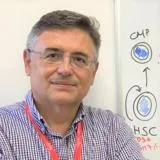16 June 2021
How a new Sickle Cell Centre for Excellence at King’s and King’s Health Partners is leading the way in tackling one of the most common genetic blood diseases in the world.
Affecting millions of people worldwide, Sickle Cell Disorder (SCD) is one of the most common genetic blood diseases in the world. The reality for people with SCD is ineffective treatments, glacially-slow progress towards a cure, and inequity at the point of care. Patients may face a lifetime of excruciating pain and chronic health problems, and many will lose their lives prematurely.
World Sickle Cell Day is the 19 June and while this helps to shine a light on these challenges, people with SCD face these issues each and every day of their lives.
SCD is most common in people with an African or Caribbean family background, but it can affect anyone, regardless of race or ethnicity. The negative experiences of people with SCD – both in the UK and around the world – have been linked to structural racism, reflecting an appalling lack of equality and equity in healthcare both from a clinical and research perspective that King’s Health Partners is determined to tackle.
King’s Health Partners (KHP) has been leading the way in the UK for SCD as Professor Jo Howard, Consultant Haematologist and Lead Clinician Guy’s and St Thomas’ NHS Foundation Trust, explains:
‘KHP already treat one third of the UK’s patients, leading on SCD treatment in many areas - such as delivering the country’s first adult transplant for the condition to cure a patient of SCD. Hence it is only right that we further develop and expand our research activities in SCD gene and cell therapy research in making an even greater impact, nationally and worldwide.’
To further this commitment, King’s Health Partners are developing plans for a new comprehensive Sickle Cell Centre of Excellence. This includes investment to accelerate research to find better treatments and cures that are accessible to more patients, and that can be delivered to people in the UK as well as those in the most-affected countries around the world.

Professor John Strouboulis, Chair in Molecular Erythropoiesis within the School of Cancer & Pharmaceutical Sciences leads the sickle cell research team:
‘In theory, SCD is a simple genetic disorder caused by a very small change in the part of our DNA that contains the instructions to make haemoglobin. It is therefore a prime target for the latest advanced therapies that allow correction of or compensation for genetic mistakes. Leveraging our existing clinical and research expertise, with additional investment via the planned new Sickle Cell Centre of Excellence, we could make huge leaps forward in a relatively short time frame.’
Through cell and gene editing the research team hopes to bring ground-breaking new therapies to patients via clinical trials within five years, with three targets in sight:
- Fixing the faulty gene that causes SCD: Rewriting the DNA sequence to read as it would in a healthy person, restoring normal haemoglobin production
- Restarting fetal haemoglobin production: Our bodies usually stop producing fetal haemoglobin in the first few months of life and switch to producing an adult form. Only the adult form is affected by SCD. By flipping the genetic switch to turn fetal haemoglobin production back on, we can stimulate healthy red blood cell production to significantly reduce the complications of SCD.
- Curing SCD before birth: Delivering gene or cell therapy to a baby while it is still in the womb – an approach that would spare patients from ever developing devastating complications of the disease and accruing irreversible organ damage.
These therapies could offer a truly lifechanging cure for patients who, until now, have had to make do with ineffective treatment and a global lack of investment in improving their care. It could meandramatically reducing pain and life-threatening side effects of SCD or even freeing people of the condition altogether – dramatically improving quality of life, mental health and life expectancy as Professor John Strouboulis explains:
‘Because our approaches involve modification of a patient’s own cells, they are not limited by the availability of a matching donor. This means many more patients would be eligible for curative treatment, with little risk of the body rejecting the cells.
‘Our ultimate goal is to translate discoveries to also benefit low-income countries, where the disorder is most prevalent. For example, delivering gene therapy while babies are still in the womb could be provided via outpatient services in low-income countries, preventing generations of children from ever developing the devastating complications of SCD.’
This research could completely transform the lives of individuals and families who are currently experiencing devastating loss, pain, and other physical, mental health and social implications.
To find out more about how King’s is moving the dial for Sickle Cell Disorder or ask about how you can support our work, contact forever@kcl.ac.uk.

